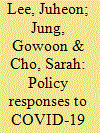| Srl | Item |
| 1 |
ID:
181035


|
|
|
|
|
| Summary/Abstract |
While South Korean racism and discrimination against migrant workers and foreign brides are not new phenomenon, some early policies adopted by the central and local governments to mitigate the impact of Covid-19 have once again revealed the country’s deep-seated xenophobia. This paper focuses on three government policies – mask rationing, universal disaster relief funds, and local government subsidies – that were adopted during the first wave of coronavirus in South Korea from February until June 2020, when supplies were insufficient and the economy was most severely affected. This paper highlights the fact that government policies were based on nationality, which led to the exclusion of foreign nationals, even long-time taxpaying residents. Such institutional discrimination was blatant, considering the country’s decades-long discussion of multiculturalism. This paper points out that, as a country with a very low number of naturalized citizens, discrimination against foreign nationals not only reflects South Korea’s perceived boundaries of in-groups and out-groups, but also demonstrates the lack of a legal basis that prohibits discriminatory practices.
|
|
|
|
|
|
|
|
|
|
|
|
|
|
|
|
| 2 |
ID:
191784


|
|
|
|
|
| Summary/Abstract |
Researchers have argued that religion has direct and indirect connections with nationalism, and they have called for conceptual clarity about the role of religion in the construction of nationalism. I extend the insights of this scholarship into reevaluating the alteration of ethnic nationalism in Korea. Drawing on interviews with evangelical Protestant women attending a megachurch in Seoul, this study explores who evangelical women are willing to include as members of Korea and in what conditions the women are inclined to include these individuals. My findings suggest that women use evangelical mission work as a rhetorical device to create a broader membership category, regardless of skin color, to imagine members of Korea. Women’s participation in volunteer works shapes their expectation of immigrants’ appreciation of Korean language, food, and civic etiquette. Challenging the prevalent view that ethnic nationalism is declining, I argue that it has survived but shifted its focus from bloodline to ethnic culture.
|
|
|
|
|
|
|
|
|
|
|
|
|
|
|
|